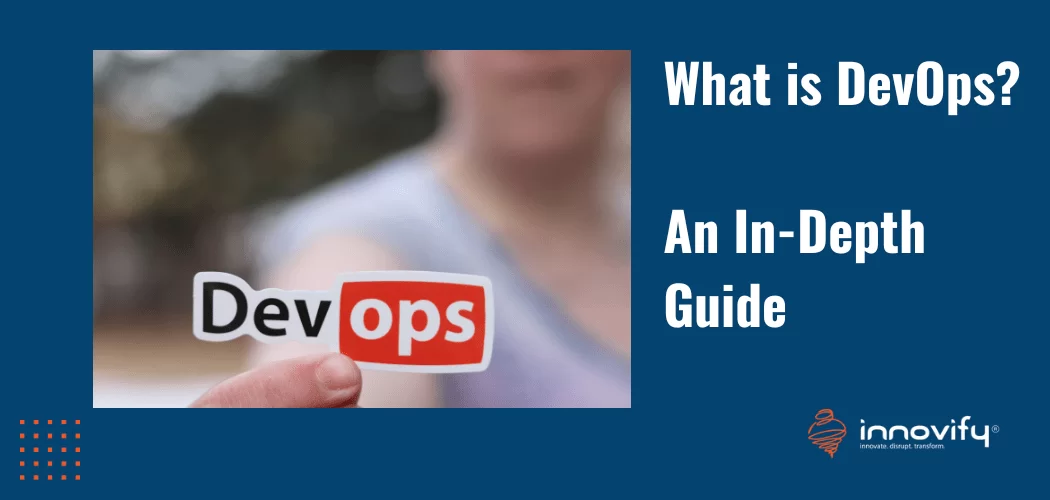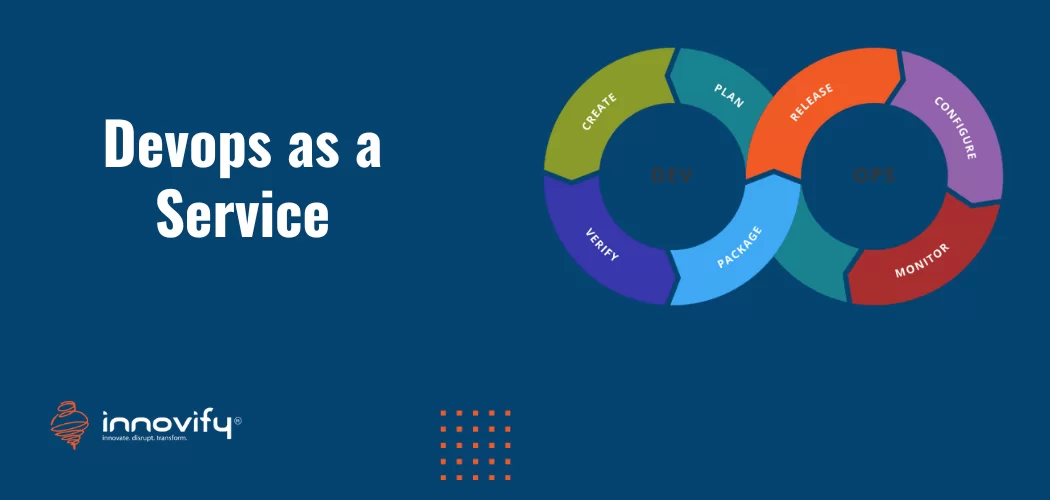AI/ML
DevOps as a Service: What You Should Know?
What is DevOps as a Service? And How to Get Going?
The infrastructure and tools required for build, testing, and deployment work can be transferred to the cloud as a service, turning DevOps into a cloud service in its entirety. That is what coined the term DevOps as a service.
We’ll examine the ramifications of such a transition in this post, including the good and the bad.
However, if you aren’t clear on what is DevOps at the first place, consider reading the following post of ours – What is DevOps? – Benefits and Implementation Explained
Let’s get right into DevOps as a service space.
What is DevOps as a Service?
DevOps-as-a-Service (DaaS) is a delivery model in which a third-party provider offers a suite of tools and services to facilitate collaboration and communication between an organization’s software development and IT operations teams. This model provides an end-to-end solution for software delivery, including continuous integration, testing, deployment, and monitoring.
By leveraging DaaS, organizations can streamline their development and operations processes, resulting in faster time-to-market, improved quality, and increased agility. Instead of using independent tools in an in-house best-of-breed toolchain approach, DaaS supplies a range of tools that cover various phases of the process and connect them as a single entity.
DaaS helps organizations achieve their objectives and follow continuous delivery (CD) and continuous integration (CI) strategies to deliver business value. Additionally, it alerts the developer group when a problem is detected in production, ensuring quick resolution of issues.

There are several types of DevOps as a service, including:
1. Public cloud-based DaaS:
It offers a range of tools and services to manage and automate the entire software development lifecycle. These providers offer a pay-as-you-go pricing model, making it an affordable option for startups and small businesses.
2. Private cloud-based DaaS:
It offers similar services as public cloud-based DaaS providers but with added security and customization options. Large enterprises with strict security and compliance requirements typically use private cloud-based DaaS.
3. Hybrid cloud-based DaaS:
It offers a combination of public and private cloud-based DaaS services. This approach allows organizations to leverage the benefits of both public and private cloud-based DaaS, such as scalability and security.
4. On-premises DaaS:
It offers DevOps tools and services that can be installed and run on the organization’s infrastructure. This approach is typically used by organizations with strict data privacy and compliance requirements, as it provides complete control over the infrastructure and data.
How does DevOps as a Service function?
DevOps as a Service (DaaS) operates by providing access to skilled DevOps professionals who utilize appropriate tools and procedures to deliver outcomes. They collaborate with your team to establish, configure, and maintain your applications.
These experts employ various DevOps solutions such as automated testing, continuous integration, IT task automation, and delivery pipelines. Through these methods, they facilitate rapid development, deployment, and monitoring of your applications.
Additionally, the professionals assist in devising and implementing DevOps strategies tailored to your organization’s requirements, including scalability, cost savings, and time-to-market.
Opting for a DaaS provider allows you to delegate DevOps responsibilities, enabling you to concentrate on achieving your business objectives.
Why is DevOps as a Service gaining popularity?
DevOps as a Service (DaaS) is swiftly emerging as one of the most popular approaches to application development and deployment. It empowers businesses to leverage the latest technology without the need to invest in an entire in-house DevOps team.
This model also aids organizations in reducing costs, enhancing agility, and improving service delivery. The experts possess the expertise to utilize the right processes and tools, resulting in faster and more reliable application development.
Moreover, DaaS simplifies numerous aspects of application development, facilitating effective collaboration between developers and IT professionals while adhering to project deadlines.
6 Pros of Using DevOps as a Service
1. Benefits for Organizations Without DevOps Expertise or Resources:
- DevOps as a Service offers advantages to organizations lacking internal DevOps skills or resources.
- It simplifies complex data and information flow management throughout the toolchain.
2. Streamlined Collaboration and Tool Accessibility
- Developers, testers, and IT operations teams can access specific DevOps as a Service platform tools.
- Developers can use source code management tools; testers can assess application performance; and IT operations teams can make configuration adjustments.
3. Monitoring and Reporting Across the Toolchain
- DevOps as a Service enables teams to monitor and report on processes throughout the toolchain. Service platform tools.
- It provides visibility and insights into the entire software delivery process.
4. Integration of Multiple DevOps Tools:
- DevOps as a Service integrates various DevOps tools into a unified system.
- This integration enhances collaboration, monitoring, management, and reporting.
5. Agile Adaptation to Customer Needs:
- Adopting a agile allows businesses to adapt to customer demands quickly.
- It enables the production of new products and services as the market evolves.
6. Complementing Conventional Development and Deployment:
- DevOps as a Service can work alongside traditional development and deployment procedures.
- It enhances existing processes and facilitates efficient software delivery.
6 Cons of Using DevOps as a Service
1. Lack of agreement on a universal DevOps toolchain:
- No consensus on a toolchain that meets all organizations’ needs.
- DevOps as a Service assumes agreement on a single toolchain.
2. Diverse requirements and preferences:
- Different organizations have different requirements and preferences.
- DevOps as a Service may not cater to all these variations.
3. Integration challenges:
- Managed DevOps services can make it difficult to integrate preferred tools.
- Fewer choices of tools available from managed DevOps providers.
4. Tradeoffs and issues:
- Speed vs. security tradeoffs and reliability/availability concerns.
- Organizations need to manage services and associated tools to control costs.
5. Complex integration with existing infrastructure:
- Internal staff must understand how DevOps services and tools integrate.
- Integration with an organization’s IT infrastructure and cloud platform can be challenging.
6. Time-consuming processes:
- DevOps processes involve numerous tasks performed quickly and accurately.
- AI integration in DevOps can automate tasks, reducing human error and enhancing efficiency.
DevOps as Service Market
The DevOps as a Service (DaaS) market is a rapidly growing segment within the software development industry. The market is being driven by the increasing adoption of DevOps practices among organizations of all sizes, as well as the need for more agile and efficient software development processes. According to a report by MarketsandMarkets, the global DevOps as a Service market is expected to grow from $3.0 billion in 2020 to $10.3 billion by 2025 at a compound annual growth rate (CAGR) of 27.5% during the forecast period.
There are several types of DevOps service providers in the market, including:
1. Pure-play DaaS providers:
These are DaaS providers that specialize in offering DevOps tools and services. These providers typically offer a wide range of services, including CI/CD, testing and deployment automation, and infrastructure management.
2. Cloud platform providers:
Cloud platform providers, such as AWS, Microsoft Azure, and Google Cloud, also offer DevOps services as part of their cloud offerings. These providers offer a range of DevOps tools and services that can be integrated with their cloud platform offerings.
3. Traditional IT service providers:
Traditional IT services providers, such as IBM, Accenture, and Infosys, have also entered the DevOps service market. These providers typically offer a range of services, including software development, testing, and deployment, as well as DevOps tools and services.
4. Open-source DevOps providers:
Open-source DevOps providers, such as Jenkins, GitLab, and Ansible, offer open-source DevOps tools and services. These providers are often favored by organizations that prefer to customize and modify their DevOps tools and services.
In-House DevOps vs. DevOps as a Service – Unbiased Face Off
Following are the simplified differences between DevOps as a Service and In-house DevOps:
| Difference Base | DevOps as a Service | In-house DevOps |
| Business Expertise | Often lack of expertise; choosing a vendor that is qualified in your domain is a must | Through domain and business expertise |
| Cost | Controlled and optimized cost | High recruitment and onboarding expenditure |
| DevOps Expertise and Experience | Yes, certified DevOps with exceptional experience | Lacks multi-project skills and experience |
| Security | High security risk; choosing a reliable DevOps service provider is a must | Lower security risks as the entire operations are handled in-house |
| Task Diversification | Expertise in a variety of discipline | Often familiarized to one type of a project only |
So, How to Pick the Right DevOps Service Provider?
The popularity of DevOps is growing rapidly, and so does of DevOps services. Because many technology service providers offer DevOps as a service, selecting the right provider can be difficult in this ever-changing IT industry.
What qualifications should you look for in a DevOps service provider? How can you tell if a provider is effective? What will work for your company? Is it a matter of technical skills or DevOps best practices knowledge?
Here are some things to keep in mind as you seek out DevOps providers:
- Decide what processes you want to enhance with DevOps. Set realistic targets and KPIs for whether you want to move to the cloud, grow your infrastructure, or decrease your cloud spending. Remember that you may also need to invest time in cleaning up your existing infrastructure.
- Focus on what you require. Consider prioritizing DevOps as a service provider with experience in your field.
- Be sure to hire a company with comprehensive tech expertise to ensure that all of your DevOps needs are met. Some offer only one cloud, while others offer a wide range of DevOps services (including CI/CD pipeline setup or cloud-to-cloud migrations).
- While comparing a number of options, choose a company with a history of successful projects. Look at their portfolio before making a decision.
- Choose a company with a pristine reputation and all necessary certifications to ensure the security and quality of the services and reduce risk.
In addition, it’s important to keep in mind DevOps security best practices to adopt. Ensure the DevOps provider has a robust security program, follows secure coding practices, and conducts regular security assessments and vulnerability scans. With the help of the aforementioned pointers and adherence to security best practices, you’ll undoubtedly benefit from DevOps services.
You can consider Innovify as your DevOps as a service provider. Our DevOps experts meet every requirement for the best DevOps service provider and will help you reach DevOps milestones in no time.
FAQs
Q1: Can DevOps as a Service (DaaS) be integrated with our existing development processes?
Yes, DevOps as a Service can be seamlessly integrated with your existing development processes. DaaS providers work closely with your team to understand your current workflows and adapt their practices to align with your processes. They ensure a smooth transition and provide ongoing support to ensure efficient collaboration between your team and the DaaS professionals.
Q2: Is DevOps as a Service suitable for both cloud-based and on-premises infrastructure?
Absolutely! DevOps as a Service is designed to work seamlessly with both cloud-based and on-premises infrastructure. Whether you have applications deployed in the cloud, on your own servers, or a combination of both, DaaS professionals can adapt their practices and tools to suit your specific infrastructure requirements.
Q3: What level of control will the organization have over the DevOps processes?
With DevOps as a Service, you retain control over the DevOps processes while leveraging the expertise of the service provider. You have visibility into the development, deployment, and monitoring activities and can actively collaborate with the DaaS team. The DaaS professionals work as an extension of your team, ensuring transparency and maintaining open communication throughout the process.
Q4: How quickly can we expect to see results after adopting DevOps as a Service?
The speed at which you see results with DevOps as a Service depends on various factors such as the complexity of your applications, the maturity of your existing processes, and the level of engagement with the DaaS provider. However, in general, you can expect to see improvements in development speed, deployment frequency, and overall application stability within a relatively short time frame.
Q5: Can DevOps as a Service help in improving the quality of our applications?
Yes, DevOps as a Service plays a crucial role in enhancing the quality of applications. DaaS providers employ automated testing, continuous integration, and delivery pipelines to ensure thorough and efficient testing processes. By implementing robust quality assurance practices, DaaS professionals help identify and address issues early in the development cycle, resulting in higher-quality applications.
Q6: Will DevOps as a Service help in ensuring compliance with industry regulations and standards?
Absolutely! DevOps as a Service providers understand the importance of compliance with industry regulations and standards. They can assist in implementing and maintaining the necessary controls and practices to ensure compliance within your DevOps processes. This includes data protection, security measures, audit trails, and other requirements specific to your industry.
Q7: Can DevOps as a Service help in reducing downtime and minimizing disruptions?
Yes, DevOps as a Service focuses on minimizing downtime and disruptions to ensure smooth application operations. DaaS professionals implement robust monitoring and alerting systems to proactively identify and address issues before they impact your users. By leveraging automation and best practices, they help optimize system performance and reduce the frequency and duration of downtime incidents.
Q8: Can we scale our DevOps resources easily with DevOps as a Service?
Absolutely! DevOps as a Service offers scalability and flexibility to meet your evolving needs. Whether you need to ramp up development efforts during peak periods or scale down during quieter times, DaaS providers can quickly adjust the resources and support to align with your requirements. This allows you to efficiently manage your DevOps capabilities without the overhead of maintaining a full-time team.




